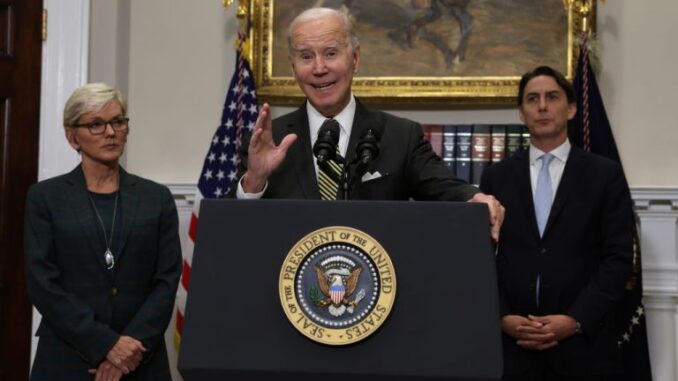
President Joe Biden promised to refill America’s emergency oil reserves at a low enough price to “actually make money for the taxpayers.” Now, his Energy Department says prices are too high to do so, ensuring that the country’s emergency reserves will remain low.
The Biden administration last week rejected all offers it received to purchase oil for the country’s dwindling reserves because those offers “were either too expensive or didn’t meet the required specifications,” Bloomberg reported Friday. The move comes just weeks after the White House said it would “turn a profit for the taxpayers” by buying up to three million reserve barrels at a reduced cost, which Biden’s Energy Department pledged to obtain by February.
Biden’s failure to follow through on the purchase means that America’s Strategic Petroleum Reserve will remain at its lowest level since 1983, at least in the short term. When Biden took office, the reserve contained more than 600 million barrels—that number is now less than 400 million. The Energy Department said in a statement that it still plans to replenish the reserves but will only do so “at a price that is a good deal for taxpayers,” making the timing and quantity of any future reserve oil purchase unclear. “We expect to share next steps in our 2023 repurchase plan soon,” a department spokeswoman told the Washington Free Beacon.
The blunder is also likely to prompt fresh criticism from congressional Republicans, who have long accused the president of mismanaging the country’s oil reserves.
Last year, amid record-high gas prices, Biden opted to release roughly 200 million reserve barrels, a decision his administration said would “address the pain Americans are feeling at the pump.” Instead, Biden sold many of those barrels to the Chinese government and other foreign entities—sales that inhibited his ability to “lower record pump prices” in the United States, according to Reuters.
House Republicans responded in July by launching a formal investigation into the Biden administration, with Rep. Ronny Jackson (R., Texas) admonishing Biden for “wasting our money and resources by sending oil that’s intended for emergencies to the Chinese Communist Party.” Roughly six months later, the GOP’s newfound House majority means Republicans have the subpoena power and committee control to advance that investigation and other energy-related oversight efforts, which House Oversight Committee chairman James Comer (R., Ky.) teased in a December op-ed.
“The president’s war on U.S.-made fossil fuels has killed well-paying jobs in energy and driven up gas and energy prices,” Comer wrote. “House Republicans will continue our investigation … into Mr. Biden’s efforts to diminish domestic energy production as part of his administration’s radical climate agenda and how he has jeopardized American energy independence.”
Beyond their impending oversight efforts, House Republicans are also targeting oil reserve reforms through new legislation. House Majority Leader Steve Scalise (R., La.) on December 30 released a bill that would bar the Energy Department from selling oil reserves “to any entity that is under the ownership, control, or influence of the Chinese Communist Party.” The bill would also prohibit Biden from releasing reserve oil without a plan to increase oil and gas drilling on federal lands.
“We wanted to start with some things on [the Strategic Petroleum Oil Reserve], which we’ve seen President Biden raid to cover for his failed policies,” Scalise said of the bill.
The White House, which did not return a request for comment, has used its oil reserve releases to take credit for falling gas prices in recent months. Energy experts, however, have linked those price reductions to fears of a looming recession.



Be the first to comment